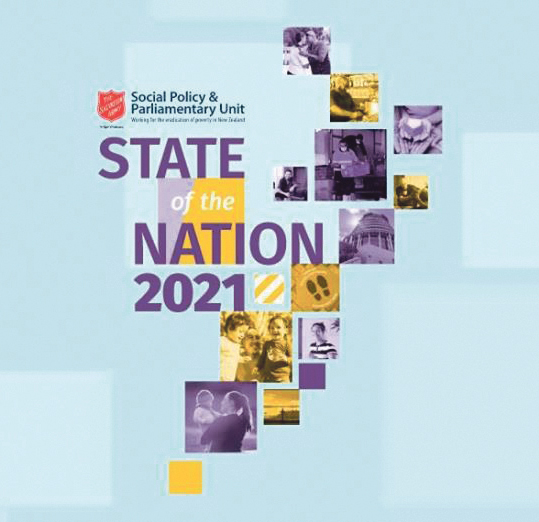WelCom March 2021

A newly-released report from the Salvation Army says that inequality, already entrenched in Aotearoa, was magnified and exacerbated by the Covid-19 pandemic.
The fourteenth annual State of the Nation 2021 report from The Salvation Army, ‘Disturbed Present. Better Future?’ points to serious, embedded and ongoing hardship for many in our communities.
The report says this hardship can be seen in rising unemployment and corresponding increases in people relying on government income support, food insecurity, housing insecurity, increasing child poverty, increasing drug use and increasing debt levels.
‘The Government’s measures to respond to the Covid-19 crisis have been significant and helped greatly to lessen impacts. However, this year’s report shows that the poorest and most vulnerable in our nation have suffered the most from these serious disturbances from Covid-19, leaving many with a gloomy future,’ says Lt-Colonel Ian Hutson, Salvation Army Social Policy and Parliamentary Unit Director.
The report provides a snapshot of what hardship looks like for the people and whānau who came through the doors of the Salvation Army over the last year.
Key findings:
- Māori Inequalities – While there was some progress on income disparity and unemployment, other long-standing disparities between Māori and non-Māori are not improving, or are worsening, especially imprisonment rates and numbers of people on the social housing register.
- Food Security – In 2020 The Salvation Army distributed more than 110,000 food parcels – double the number in 2019. This is the highest number in the 14 years of this report.
- Housing – the ‘sharper end’ of housing is very worrying, with soaring numbers on the social housing register, in transitional housing, and receiving emergency housing grants. There are also serious challenges facing renters and first-home buyers.
- Children – The number of children in benefit households increased by more than 23,000 during 2020, and Covid-19 has impacted more heavily on students from lower decile schools. But there is some good progress, with continuing decreases in youth offending and teen pregnancies.
- Social hazards – Methamphetamine continues to dominate drug offences; cannabis offences declined; and financial hardship worsened in 2020 with more clients presenting to The Salvation Army with higher debt levels.
- Crime and punishment – The trends seen in offending and victimisation in previous State of the Nation reports have continued in 2020.
- Work and incomes – Government spending on welfare massively increased because of Covid-19, focused mainly on short-term responses such as the Wage Subsidy Scheme, but the impacts will be long-lasting. There is rising unemployment and youth unemployment rose during the year, and those not in education, employment, or training (NEET) is now the highest number since 2012.
This report is available for viewing or download from: www.salvationarmy.org.nz/SOTN2021